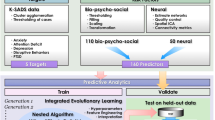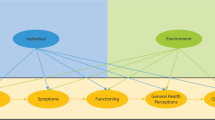Abstract
Background
This study aimed to identify contextual factors associated with life satisfaction during the COVID-19 pandemic for adolescents with mental, emotional, behavioral, and developmental (MEBD) disabilities.
Methods
Data were collected from a sample of 1084 adolescents aged 11–21 years from April 2020 to August 2021. This cross-sectional study used a sequential machine learning workflow, consisting of random forest regression and evolutionary tree regression, to identify subgroups of adolescents in the Environmental influences on Child Health Outcomes (ECHO) consortium who demonstrated enhanced vulnerability to lower life satisfaction as described by intersecting risk factors, protective factors, and MEBD disabilities.
Results
Adolescents with a history of depression, anxiety, autism, and attention-deficit/hyperactivity disorder were particularly susceptible to decreased life satisfaction in response to unique combinations of stressors experienced during the COVID-19 pandemic. These stressors included decreased social connectedness, decreased family engagement, stress related to medical care access, pandemic-related traumatic stress, and single-caregiver households.
Conclusion
Findings from this study highlight the importance of interventions aimed specifically at increasing adolescent social connectedness, family engagement, and access to medical support for adolescents with MEBD disabilities, particularly in the face of stressors, such as a global pandemic.
Impact
-
Through a machine learning process, we identified contextualized risks associated with life satisfaction among adolescents with neurodevelopmental disabilities during the COVID-19 pandemic.
-
The COVID-19 pandemic resulted in large-scale social disruptions for children and families. Such disruptions were associated with worse mental health outcomes in the general pediatric population, but few studies have examined specific subgroups who may be at heightened risk. We endeavored to close that gap in knowledge.
-
This study highlights the importance of social connectedness, family engagement, and access to medical support as contributing factors to life satisfaction during the COVID-19 pandemic for adolescents with neurodevelopmental disabilities.
This is a preview of subscription content, access via your institution
Access options
Subscribe to this journal
Receive 14 print issues and online access
$259.00 per year
only $18.50 per issue
Buy this article
- Purchase on Springer Link
- Instant access to full article PDF
Prices may be subject to local taxes which are calculated during checkout


Similar content being viewed by others
Data availability
De-identified data from the ECHO Program are available through NICHD’s Data and Specimen Hub (DASH) (https://dash.nichd.nih.gov). DASH is a centralized resource that allows researchers to access data from various studies via a controlled-access mechanism. Researchers can now request access to these data by creating a DASH account and submitting a Data Request Form. The NICHD DASH Data Access Committee will review the request and provide a response in approximately two to three weeks. Once granted access, researchers will be able to use the data for three years. See the DASH Tutorial for more detailed information on the process (https://dash.nichd.nih.gov/resource/tutorial).
References
Raviv, T. et al. Caregiver perceptions of children’s psychological well-being during the COVID-19 pandemic. JAMA Netw. Open 4, e2111103 (2021).
Martinelli K., Cohen Y., Kimball H., Sheldon-Dean H. 2020 children’s mental health report: Telehealth in an increasingly virtual world. Child Mind Institute. https://childmind.org/awareness-campaigns/childrens-mental-health-report/2020-childrens-mental-health-report/. Published 2020. Accessed February 27, 2023.
Blakemore, S. J. & Mills, K. L. Is adolescence a sensitive period for sociocultural processing? Annu Rev. Psychol. 65, 187–207 (2014).
Orben, A., Tomova, L. & Blakemore, S.-J. The effects of social deprivation on adolescent development and mental health. Lancet Child Adolesc. Health 4, 634–640 (2020).
Racine, N. et al. Global prevalence of depressive and anxiety symptoms in children and adolescents during COVID-19: A meta-analysis. JAMA Pediatr. 175, 1142–1150 (2021).
Whitehead M., Taylor-robinson D., Barr B. Poverty, health, and covid-19 yet again, poor families will be hardest hit bytthe pandemic’s long economic fallout. BMJ. 372, (2021).
Nonweiler, J. et al. Prevalence and associated factors of emotional and behavioural difficulties during COVID-19 pandemic in children with neurodevelopmental disorders. Children 7, 128 (2020).
Shorey, S. et al. Families with children with neurodevelopmental disorders during COVID-19: A scoping review. J. Pediatr. Psychol. 46, 514–525 (2021).
Blackwell C. K. et al. Youth well-being during the COVID-19 pandemic. Pediatrics. 149, (2022).
Paizan, M. A., Benbow, A. E., Aumann, L. & Titzmann, P. F. Home-learning during COVID-19: The psychological adjustment of minority and majority adolescents. Sch. Psychol. 37, 75–84 (2021).
Blaisdell, C. J. et al. The NIH ECHO program: Investigating how early environmental influences affect child health. Pediatr. Res. 92, 1215–1216 (2022).
Gillman, M. W. & Blaisdell, C. J. Environmental influences on Child Health Outcomes, a research program of the National Institutes of Health. Curr. Opin. Pediatr. 30, 260–262 (2018).
National Academies of Sciences E, Medicine. The promise of adolescence: Realizing opportunity for all youth. Washington, DC, The National Academies Press 2019.
Mackey, K. et al. Racial and ethnic disparities in COVID-19-related infections, hospitalizations, and deaths : A systematic review. Ann. Intern Med 174, 362–373 (2021).
Massion, S. P., Murry, V. M. & Grijalva, C. G. Racial disparities in COVID-19 outcomes: Unwarranted statistical adjustments and the perpetuation of stereotypes. Lancet Reg. Health Am. 14, 100352 (2022).
Chandran, A., Knapp, E., Liu, T. & Dean, L. T. A new era: Improving use of sociodemographic constructs in the analysis of pediatric cohort study data. Pediatr. Res. 90, 1132–1138 (2021).
Forrest, C. B. et al. Development and psychometric evaluation of the promis pediatric life satisfaction item banks, child-report, and parent-proxy editions. Qual. Life Res. 27, 217–234 (2018).
Margolis A. et al. Acute stress questions for ECHO COVID-19 survey. PsychArchives. (2021).
American Psychiatric Association. Diagnostic and statistical manual of mental disorders (5th ed.). 2013.
Blackwell, C. K. et al. Development and Psychometric Validation of the Pandemic-related Traumatic Stress Scale for Children and Adults. Psychol. Assess. (2023).
Thomason M. E., Graham A., VanTieghem M. R. The cope-is: Coronavirus perinatal experiences – impact survey. https://www.nlm.nih.gov/dr2/COPE-Impact_Survey_Perinatal_Pandemic_Survey.pdf Published 2020.
Lee, R. M. & Robbins, S. B. Measuring belongingness: The social connectedness and the social assurance scales. J. Counseling Psychol. 42, 232–241 (1995).
Pfeifer J. H. Adolescent social connection and coping during COVID questionnaire. https://osf.io/jakg5/. Published 2020.
Breiman, L. Random forests. Mach. Learn. 45, 5–32 (2001).
Grubinger, T., Zeileis, A. & Pfeiffer, K.-P. Evtree: Evolutionary learning of globally optimal classification and regression trees in r. J. Stat. Softw. 61, 1–29 (2014).
van Buuren, S. & Groothuis-Oudshoorn, K. Mice: Multivariate imputation by chained equations in r. J. Stat. Softw. 45, 1–67 (2011).
M. K. _caret: Classification and regression training_. R package version 6.0-92. https://CRAN.R-project.org/package=caret. Published 2022. Accessed February 27, 2023.
Naito T. et al. Did children in single-parent households have a higher probability of emotional instability during the COVID-19 pandemic? A nationwide cross-sectional study in japan. Int. J. Environ. Res. Public Health. 19, (2022).
Taylor, Z. E. et al. Strengths of the heart: Stressors, gratitude, and mental health in single mothers during the COVID-19 pandemic. J. Fam. Psychol. 36, 346–357 (2022).
Asmundson, G. J. G. et al. Do pre-existing anxiety-related and mood disorders differentially impact COVID-19 stress responses and coping? J. Anxiety Disord. 74, 102271 (2020).
Blackwell, C. K. et al. General health and life satisfaction in children with chronic illness. Pediatrics 143, e20182988 (2019).
Schuchard, J. et al. Influences of chronic physical and mental health conditions on child and adolescent positive health. Acad. Pediatr. 22, 1024–1032 (2022).
Dvorsky, M. R. et al. Coping with COVID-19: Longitudinal impact of the pandemic on adjustment and links with coping for adolescents with and without adhd. Res. child Adolesc. Psychopathol. 50, 605–619 (2022).
Acknowledgements
We wish to thank our ECHO colleagues; the medical, nursing, and program staff; and the children and families participating in the ECHO cohorts.
Funding
Research reported in this publication was supported by the Environmental influences on Child Health Outcomes (ECHO) program, Office of the Director, National Institutes of Health, under Award Numbers U2COD023375 (Coordinating Center), U24OD023382 (Data Analysis Center), U24OD023319 with co-funding from the Office of Behavioral and Social Sciences Research (PRO Core), UH3OD023332 (Trasande), UH3OD023313 (Deoni), UH3OD023282 (Gern), UH3OD023389 (Leve, Neiderhiser, Ganiban), UH3OD023286 (Oken), UH3OD023348 (O’Shea), UH3OD023290 (Herbstman, Perera), UH3OD023249 (Stanford). The content is solely the responsibility of the authors and does not necessarily represent the official views of the National Institutes of Health.
Author information
Authors and Affiliations
Consortia
Contributions
P.S. and M.M.: substantial contributions to conception and design, analysis and interpretation of data, drafting the article or revising it critically for important intellectual content, final approval of the version to be published. C.K.B.: substantial contributions to conception and design, drafting the article or revising it critically for important intellectual content, final approval of the version to be published. C.B., Deoni, Fry, Ganiban, Herbstman, Leve, LeWinn, Margolis, Miller, Neiderhiser, Oken, O’Shea, and Stanford: acquisition of data and drafting the article or revising it critically for important intellectual content, final approval of the version to be published. D.C., R.G., J.-S.L. and P.D.Z.: drafting the article or revising it critically for important intellectual content, final approval of the version to be published. All authors approved the final manuscript as submitted and agree to be accountable for all aspects of the work.
Corresponding author
Ethics declarations
Competing interests
The authors declare no competing interests.
Consent for publication
Written informed consent or parent’s/guardian’s permission was obtained along with child assent as appropriate, for ECHO-wide Cohort Data Collection Protocol participation and for participation in specific cohorts.
Additional information
Publisher’s note Springer Nature remains neutral with regard to jurisdictional claims in published maps and institutional affiliations.
Supplementary information
Rights and permissions
Springer Nature or its licensor (e.g. a society or other partner) holds exclusive rights to this article under a publishing agreement with the author(s) or other rightsholder(s); author self-archiving of the accepted manuscript version of this article is solely governed by the terms of such publishing agreement and applicable law.
About this article
Cite this article
Sherlock, P., Mansolf, M., Blackwell, C.K. et al. Life satisfaction for adolescents with developmental and behavioral disabilities during the COVID-19 pandemic. Pediatr Res 95, 827–834 (2024). https://doi.org/10.1038/s41390-023-02852-3
Received:
Revised:
Accepted:
Published:
Issue Date:
DOI: https://doi.org/10.1038/s41390-023-02852-3



